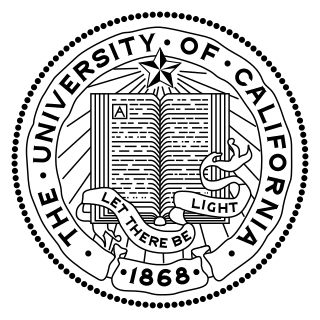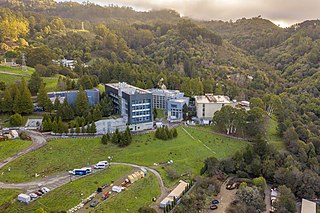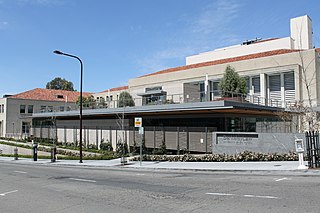Feng Wang is an American physicist, currently at University of California, Berkeley and an Elected Fellow of the American Physical Society. [1]
Feng Wang is an American physicist, currently at University of California, Berkeley and an Elected Fellow of the American Physical Society. [1]
Wang received a B.A. from Fudan University, Shanghai, in 1999 and a Ph.D. from Columbia University in 2004. [1]

The University of California (UC) is a public land-grant research university system in the U.S. state of California. Headquartered in Oakland, the system is composed of its ten campuses at Berkeley, Davis, Irvine, Los Angeles, Merced, Riverside, San Diego, San Francisco, Santa Barbara, and Santa Cruz, along with numerous research centers and academic abroad centers. The system is the state's land-grant university. Major publications generally rank most UC campuses as being among the best universities in the world. In 1900, UC was one of the founders of the Association of American Universities and since the 1970s seven of its campuses, in addition to Berkeley, have been admitted to the association. Berkeley, Davis, Santa Cruz, Irvine, Los Angeles, Santa Barbara, and San Diego are considered Public Ivies, making California the state with the most universities in the nation to hold the title. UC campuses have large numbers of distinguished faculty in almost every academic discipline, with UC faculty and researchers having won 71 Nobel Prizes as of 2021.

The University of California, Berkeley, is a public land-grant research university in Berkeley, California. Founded in 1868 as the University of California and named after Anglo-Irish philosopher George Berkeley, it is the state's first land-grant university and the founding campus of the University of California system. Berkeley is also a founding member of the Association of American Universities. Berkeley has been regarded to be among the top universities in the world.

The University of California, Davis, is a public land-grant research university in Davis, California, United States. It is the northernmost of the ten campuses of the University of California system. The institution was first founded as an agricultural branch of the system in 1905 and became the seventh campus of the University of California in 1959.

The California State University is a public university system in California, and the largest public university system in the United States. It consists of 23 campuses and seven off-campus centers, which together enroll 457,992 students and employ 56,256 faculty and staff members. In California, it is one of the three public higher education systems, along with the University of California and the California Community Colleges systems. The CSU system is officially incorporated as The Trustees of the California State University, and is headquartered in Long Beach, California.

Lawrence Berkeley National Laboratory (LBNL) is a federally funded research and development center in the hills of Berkeley, California, United States. Established in 1931 by the University of California (UC), the laboratory is sponsored by the United States Department of Energy and administered by the UC system. Ernest Lawrence, who won the Nobel prize for inventing the cyclotron, founded the Lab and served as its Director until his death in 1958. Located in the Berkeley Hills, the lab overlooks the campus of the University of California, Berkeley.

The University of California College of the Law, San Francisco is a public law school in San Francisco, California, United States. The law school was formerly known as the University of California, Hastings College of the Law from 1878 to 2023.

People's Park in Berkeley, California, is a plot of land that is owned by the University of California, Berkeley. Located east of Telegraph Avenue, bound by Haste and Bowditch Streets, and Dwight Way, People's Park was a symbol during the radical political activism of the late 1960s.

The UC Berkeley Graduate School of Journalism is a graduate professional school on the campus of University of California, Berkeley. It is among the top graduate journalism schools in the United States, and is designed to produce journalists with a two-year Master of Journalism (MJ) degree. It also offers a summer minor in journalism to undergraduates and a journalism certificate option to non–UC Berkeley students.
"Public Ivy" is an informal term to refer to public colleges and universities in the United States that are perceived to provide a collegiate experience on the level of Ivy League universities. There is no trademark for the term, and the list of schools associated with the classification has changed over time.

The University of California, Berkeley School of Public Health, also called Berkeley Public Health, is one of fourteen schools and colleges at the University of California, Berkeley. The School of Public Health is consistently rated alongside the best in the nation, with recent rankings placing its doctoral programs in Epidemiology, Biostatistics, Environmental Health Sciences, and Health Policy among the top in their fields, The school is ranked 8th in the country by U.S. News & World Report. Established in 1943, it was the first school of public health west of the Mississippi River. The school is currently accredited by the Council on Education for Public Health.
Frederic Evans Wakeman Jr. was an American scholar of East Asian history and Professor of History at University of California, Berkeley. He served as president of the American Historical Association and of the Social Science Research Council. Jonathan D. Spence said of Wakeman that he was an evocative writer who chose, "like the novelist he really wanted to be, stories that split into different currents and swept the reader along," adding that he was "quite simply the best modern Chinese historian of the last 30 years."
Junichi P. Semitsu is a professor of law at the University of San Diego and the exclusive blogger for The Chicks. He co-created the pop culture and politics blog, Poplicks.com, with Oliver Wang. He also previously served as the Director of June Jordan's Poetry for the People at University of California, Berkeley. He also appeared as a contestant on Who Wants to Be a Millionaire? on January 11 and 14, 2008.
The history of the University of California, Berkeley begins on October 13, 1849, with the adoption of the Constitution of California, which provided for the creation of a public university. On Charter Day, March 23, 1868, the signing of the Organic Act established the University of California, with the new institution inheriting the land and facilities of the private College of California and the federal funding eligibility of a public agricultural, mining, and mechanical arts college.

The University of California, Berkeley, School of Law is the law school of the University of California, Berkeley. The school was commonly referred to as "Boalt Hall" for many years, although it was never the official name. This came from its initial building, the Boalt Memorial Hall of Law, named for John Henry Boalt. This name was transferred to a new classroom wing in 1951 but was removed in 2020.

Alva Noë is an American philosopher. He is Professor of Philosophy at the University of California, Berkeley. The focus of his work is the theory of perception and consciousness. In addition to these problems in cognitive science and the philosophy of mind, he is interested in analytic phenomenology, the theory of art, Ludwig Wittgenstein, enactivism, and the origins of analytic philosophy.

Kam-Biu Luk is a professor of physics, with a focus on particle physics, at UC Berkeley and a senior faculty scientist in the Lawrence Berkeley National Laboratory's physics division. Luk has conducted research on neutrino oscillation and CP violation. Luk and his collaborator Yifang Wang were awarded the 2014 Panofsky Prize "for their leadership of the Daya Bay experiment, which produced the first definitive measurement of θ13 angle of the neutrino mixing matrix." His work on neutrino oscillation also received 2016 Breakthrough Prize in Fundamental Physics shared with other teams. He also received a Doctor of Science honoris causa from the Hong Kong University of Science and Technology in 2016. Luk is a fellow of the American Physical Society, and the American Academy of Arts and Sciences.
John Michael Prausnitz is an emeritus professor of chemical engineering at the University of California, Berkeley.

The 2017 Berkeley protests were a series of protests and clashes between organized groups that occurred in the city of Berkeley, California, in the vicinity of the University of California campus. Violence occurred predominantly between protesters opposed to then-President Donald Trump, including activists such as antifa groups and socialists; and pro-Trump groups such as Republicans, members of the alt-lite and alt-right, neo-Nazis, and white nationalists. The majority of the participants were peaceful.